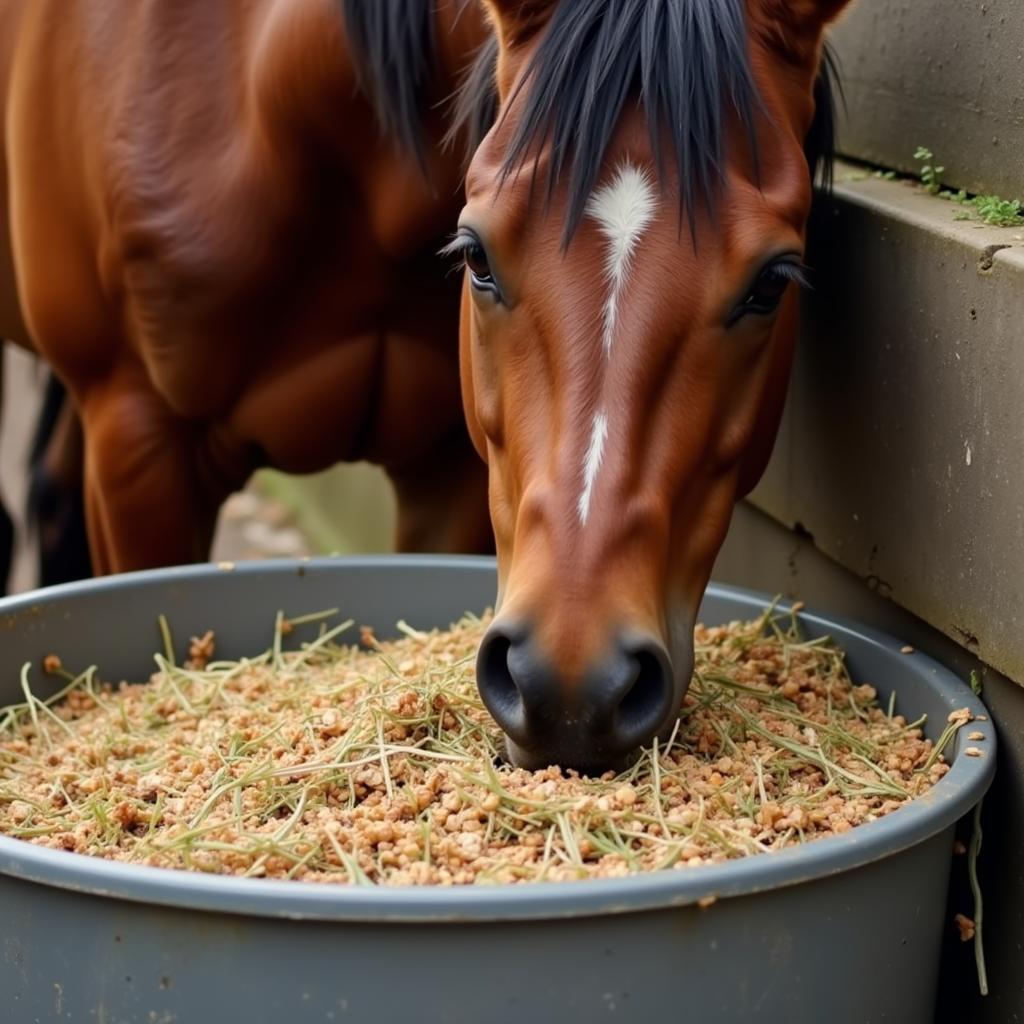Horse Feed Nsc, or non-structural carbohydrates, plays a vital role in equine nutrition. Understanding how NSCs impact your horse’s health and performance is crucial for responsible horse ownership. This guide delves into the complexities of horse feed NSC, providing you with the knowledge to make informed decisions about your horse’s dietary needs.
What are Non-Structural Carbohydrates (NSCs)?
NSCs are the easily digestible carbohydrates found in horse feed. They include sugars, starches, and fructans. These components provide a readily available energy source for your horse, fueling their daily activities and athletic pursuits. Managing NSC intake is particularly important for horses prone to metabolic issues like insulin resistance, laminitis, and Equine Metabolic Syndrome (EMS).
 Horse Eating NSC Rich Feed
Horse Eating NSC Rich Feed
Why is Horse Feed NSC Important?
Balancing NSC levels in your horse’s diet is essential for maintaining their overall well-being. While NSCs provide essential energy, excessive intake can lead to various health problems. Horses evolved to graze on low-NSC forage, and their digestive systems aren’t always equipped to handle large amounts of concentrated carbohydrates. Choosing the right horse feed with appropriate NSC levels is a cornerstone of proper equine care. You might want to consider selling or buying a horse if you’re unable to provide proper care. See our selection of horses for sale near me under 1000.
How to Determine the Right NSC Levels for Your Horse
The ideal NSC level for your horse depends on several factors, including their age, activity level, and metabolic health. Performance horses require higher NSC levels to support their increased energy demands, while leisure horses and those with metabolic conditions need lower NSC diets. Consulting with an equine nutritionist or veterinarian can provide personalized recommendations based on your horse’s individual needs.
Managing NSC Intake Through Forage and Feed Selection
Careful selection of forage and feed is key to controlling NSC levels. Testing your hay for NSC content is crucial, especially for horses prone to metabolic issues. Opting for low-NSC hay varieties and avoiding high-sugar feeds like molasses-rich grains can help keep your horse’s NSC intake within a healthy range. If you are looking to experience something new with horses, consider learning more about horse liberty.
Tips for Choosing Low-NSC Horse Feed
- Read Feed Labels Carefully: Pay close attention to the NSC percentage listed on the feed label.
- Choose Forage First: Prioritize high-quality, low-NSC hay as the foundation of your horse’s diet.
- Limit Concentrates: Use concentrates sparingly and only when necessary to meet energy requirements.
- Consider Soaking Hay: Soaking hay can help reduce its NSC content, particularly for horses with metabolic sensitivities.
“Understanding the nuances of horse feed NSC is paramount for ensuring the longevity and well-being of our equine companions,” says Dr. Emily Carter, DVM, an equine nutrition specialist. “Just like humans, horses benefit from balanced nutrition, and NSC management is a critical piece of that puzzle.”
Common Misconceptions about Horse Feed NSC
One common misconception is that all carbohydrates are bad for horses. In reality, NSCs are a vital energy source. The key is moderation and selecting the appropriate types and amounts of carbohydrates based on individual needs. Another misconception is that only overweight horses need to worry about NSC intake. While weight management is important, horses of all sizes and activity levels can be affected by excessive NSC consumption. “Remember,” adds Dr. Carter, “NSC management is about providing balanced nutrition, not eliminating carbohydrates altogether.” Perhaps a horse drawn produce farm would be a good option for naturally feeding your horse. If you are on a budget, check out our horses under 500 for sale.
Conclusion
Understanding horse feed NSC is an essential aspect of responsible horse ownership. By carefully monitoring your horse’s NSC intake and making informed feed choices, you can contribute to their overall health, well-being, and performance. Balancing NSC levels isn’t just about preventing metabolic issues; it’s about optimizing your horse’s nutrition to ensure they thrive. Looking for a place to camp with your horse? Consider our horse camps at otter creek.
FAQ
- What are the symptoms of high NSC intake in horses?
- Can I test my hay for NSC content?
- What are some examples of low-NSC horse feeds?
- How can I transition my horse to a low-NSC diet?
- Is it necessary to supplement vitamins and minerals when feeding a low-NSC diet?
- How does exercise affect NSC requirements?
- What is the difference between structural and non-structural carbohydrates?
When you need assistance, please contact us via Phone: 0772127271, Email: [email protected] or visit our address at QGM2+WX2, Vị Trung, Vị Thuỷ, Hậu Giang, Việt Nam. Our customer service team is available 24/7.